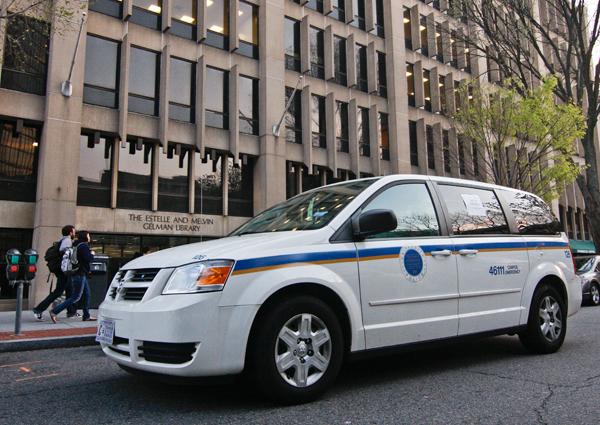Imagine this scenario, a common one for this time of year: It’s cold. It’s raining. A group of students leaving their residence hall hop into a heated 4-RIDE van to keep warm and get to their destination safely.
Sounds luxurious, right? Unfortunately, this option isn’t so easily accessible for students like me who have physical disabilities.

The University has just one wheelchair-accessible van that’s able to accommodate my needs. But you cannot request it on either GW’s mobile app or the 4-RIDE website – you have to call the main number and they’ll dispatch the van.
Now, it may seem like I’m making a mountain out of a molehill. You have to call in and request a specific van – so what? But GW should recognize that it’s inherently wrong to have differing services for two groups of students. It’s wrong to underserve a section of the student body while touting 4-RIDE’s benefits to everyone else. In fact, I’ve always been wary of using 4-RIDE for this exact reason – to avoid making a fuss.
University spokesman Kurtis Hiatt told me that the Division of Operations is looking into adding accessibility information to future app upgrades – a move the director of Disability Support Services, Susan McMenamin, told me she would support. But Hiatt declined to provide any more specifics.
An upgrade to the app would be great, but it obviously doesn’t solve the entire problem. For starters, one handicap-accessible van is not enough – what if it breaks down? And most vans can only accommodate one wheelchair at a time, so by having just one van, the University is failing to serve the needs of an entire population of students. McMenamin told me there are at least four students on campus who are currently using mobility devices.
When I went on a campus tour of GW, the tour guide highlighted 4-RIDE as a major selling point. But unbeknownst to me, the University has not included me and others like me in this service that transports more than 100,000 riders every year.
We like to think that GW is progressive on issues like differing abilities – and in some areas, it is. For instance, I have access to all Vern Express buses in my wheelchair. That’s an improvement from a few years ago, when as a freshman I’d sometimes have to wait 15 or 20 minutes at a time – sometimes out in the cold or rain – as bus after bus would depart without being able to accommodate me.
Clearly, GW recognized the importance of serving students equally back then, but it’s time the same good conscience expands to include 4-RIDE.
Yes, a big appeal of 4-RIDE has to do with keeping students comfortable. And we’ve all heard stories of people who use the service on the way home from the library, for example, simply because they are too tired or lazy to schlep themselves to a destination. GW even added massive 15-passenger vans last year just to accommodate students going to bars off campus.
But while I’ve quibbled about the cold and rain, the greatest utility of the program is to keep students safe. Many students – particularly women – opt to travel in the safety of a 4-RIDE van instead of walking alone or in small groups at night.
Those skeptical about potential campus dangers need look no further than the gruesome alleged attack on a woman walking just off campus late last semester. The three male suspects remain unidentified.
Providing 4-RIDE is a great safety measure, but it’s irresponsible not to have this service equally available to all students. Students with disabilities are just as – if not more – susceptible to the dangers faced by young people traversing a city at night.
New York University seems to understand the importance of this need: There, the Office of Public Safety provides at least one accessible Safe Ride van for students with disabilities, and touts that service on their web site – something GW fails to do. The District isn’t as big a city as New York, obviously, but that doesn’t mean our safety concerns are any less significant.
By not having enough handicap-accessible 4-RIDE vans that are easy to request, we’re leaving some students in a vulnerable position. We’re failing to protect all of our students.
Jaggar DeMarco, a junior majoring in political communication, is a Hatchet columnist.





